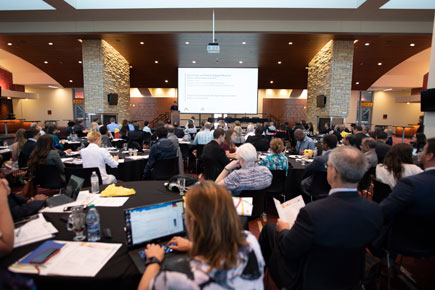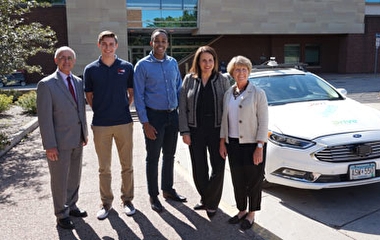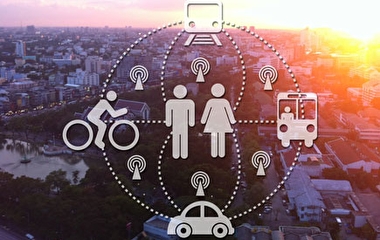In June, CTS hosted the annual summer meeting of the Council of University Transportation Centers (CUTC). More than 130 attendees from college and university centers and institutes focused on transportation research, education, and outreach gathered in Minneapolis for the event.
In the opening keynote, Carissa Slotterback, associate dean of the Humphrey School of Public Affairs, discussed the importance of collaborative engagement in transportation research. She also described how university transportation centers can serve as the models for this engagement on their campuses. Overall, Slotterback said, this involves moving from a push-out to a pull-in approach.
According to Slotterback, transportation research has both an imperative and competitive advantage when it comes to collaboration and engagement. First, the field is naturally multidisciplinary, ranging from engineering to public health to urban planning, and multidisciplinary work requires collaboration. Transportation is also multisector, with distributed authority and resources across all levels of government. “If we had a single authority, it would be much easier to do our work,” Slotterback said. “Since [we don’t], we have to think about being engaged across the distributed system.”
Transportation’s lack of diversity is another important reason for collaborative engagement. “We know we’re not representative,” Slotterback said. “Bringing in additional perspectives is critical to ensuring that our research is responsive to the needs of our communities.”
In addition, although transportation is a technical-solutions-oriented field, it is evolving. This includes increasing connections to a broader range of social, economic, environmental, and political concerns. “As the field becomes more complex and we realize the limitations of our technical solutions, it requires us to be more collaborative and engaged,” Slotterback said. “That’s essential for producing high-quality work and applying solutions that are contextual and relevant.”
Finally, transportation is personal, and everyone experiences it. “We are all experts,” Slotterback said. “We all experience transportation every day, and it touches everyone’s life. As researchers, we should be thinking about how to tap into that expertise and value it.”
Slotterback then outlined some characteristics of collaborative and engaged research, including ideas for how to put each of them into practice.
- Power is redistributed. Expertise is valued, acknowledged, and brought to the table, no matter where it comes from—including academics, practitioners, and communities. Ask potential collaborators what would make the interaction most valuable for them.
- All play a role in setting the agenda. Codefine the research question, gain context from your partners, and continuously redefine the agenda.
- Work together on research. Practitioners can be more than just advisors; they can be active members of the research team, along with academics. Make use of crowdsourced data as well as student workers, especially for quick turnarounds.
- Little things show value and respect at events. Consider who is on the agenda and how much time they get. Be thoughtful about room and seating arrangements and take advantage of opportunities to curate conversations.
- Use your power to engage those not represented. Look across and outside your university, including at small nonprofits working in diverse communities. Identify emerging leaders, big thinkers, and future superstars who aren’t usually invited to the table.
- Sustain engagement. Offer opportunities for ongoing engagement: cocreate rather than just update. Connect new faculty to external partners and engage younger practitioners and students. Use your power and platform to sustain relationships with underrepresented organizations.
“Our field is changing. Our communities are changing. Our universities are changing,” Slotterback said. “Our research is needed. Don’t underestimate your power and your ability to do good.”



